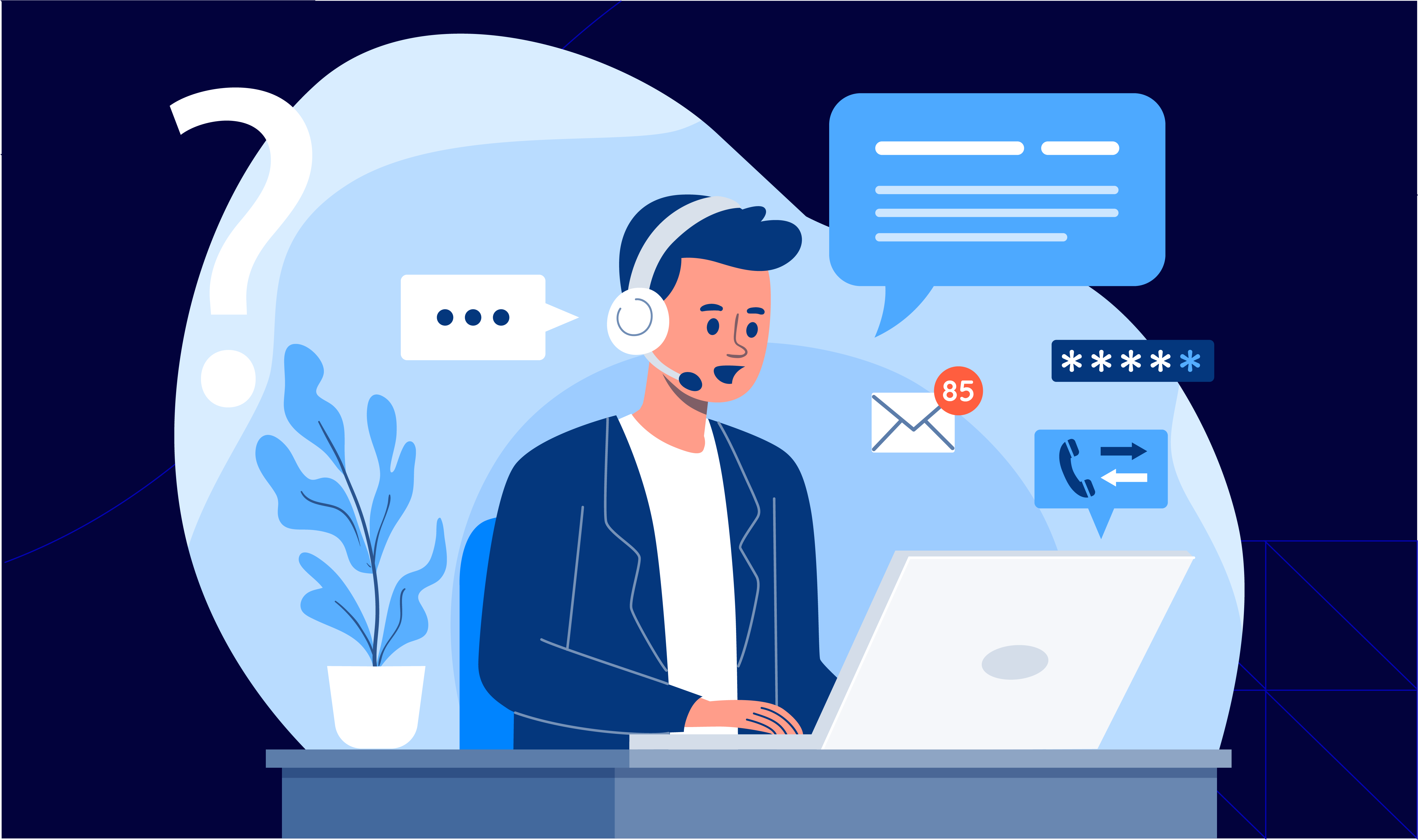Introduction
Customer service is one of the core values of a company that helps in building a strong customer-company relationship. It is the support the company offers to its customers before, during and after they purchase a product or service. A customer service specialist deals with answering customers’ inquiries and complaints as well as making sure that customer experience with a business is satisfactory. They also help foster, manage, and nurture customer relationships, address issues, and even retain clientele.
For consumer brands and D2C companies in the US, UK & Australia, customer service specialists play a critical role, they are the first point of communication between the customer and the brand. Senior leaders in Customer Experience and Support functions (VPs, Directors, Sr. Managers) recognize that a well-trained specialist impacts customer loyalty, retention and lifetime value.
Most social studies have observed that customer satisfaction directly influences customer loyalty. It determines the reputation of the brand. Therefore, allocating significant resources to quality customer service will improve the organization’s ability to attract many customers and enhance customer loyalty.
Why Customer Service Matters?

Customer satisfaction is imperative in the contemporary business environment. Those firms that concern themselves with customer care record better customer satisfaction, higher sales, and consequent customer loyalty.
According to HubSpot (2023), 93% of customers are more likely to make repeat purchases from businesses with excellent customer service. (Source)
This is true for fast-scaling consumer brands with revenues of $5M+ and employee teams of 5+, where every customer touchpoint can either strengthen or damage brand image.
In this article, we will explore customer care roles and responsibilities and why they are essential in every industry.
What Is a Customer Service Specialist?

A customer service specialist is a professional who assists in solving the queries of customers. They act as intermediaries between the company and their customers so that they deliver high satisfaction and customer loyalty.
For businesses focused on customer experience, specialists are not only problem-solvers but also brand ambassadors, they represent the tone, empathy and professionalism of the company in each and every interaction.
Key Responsibilities of a Customer Service Specialist:

A report by Salesforce (2023) states that 80% of customers consider their experience with a company as important as its products or services. (Source). This is important because customer service specialists help customers build strong relations with the company and offer a better customer experience.
1. Handling Customer Inquiries
The role of customer service specialists involves answering queries from customers. Such queries may include questions about products, policies, service issues, or with regard to an account. The multi-channel approach used by specialists while communicating with customers includes:
- Phone support – answering direct calls and resolving concerns in real time
- Email assistance – responding to inquiries with detailed information
- Live chat – providing immediate support through website or app-based messaging
- Social media support – addressing concerns via platforms like Twitter, Facebook, and Instagram
Key Qualities Required for Managing Inquiries:
- Strong communication skills to explain complex solutions in simple terms
- Active listening to understand the customer’s exact concerns
- Patience and empathy to ensure customers feel valued
Example: A customer contacts an online retailer about a delayed package. The specialist quickly checks the order status, provides an estimated delivery time, and offers compensation for the inconvenience if necessary.
Why It Matters: Handling inquiries well helps reduce churn and build loyalty — a priority for CX leaders in competitive consumer markets.
2. Resolving Complaints and Issues
Managing customers’ complaints is one of the important aspects of communicating with customers. This can include product quality, a bad service encounter, or an incorrect billing statement. Herein, specialists have to appear to be ‘listening’ and, most importantly be sympathetic and produce a satisfactory resolution.
Steps to Resolve Complaints Effectively:
- Listen Actively – Let the customer express their concerns without interruption.
- Acknowledge the Problem – Show empathy and validate their frustration.
- Investigate the Issue – Gather relevant details and check company policies.
- Offer a Solution – Provide a resolution that aligns with company policies and satisfies the customer.
- Follow Up – Ensure the issue was resolved to the customer’s satisfaction.
Example: A buyer buys a product and either finds it faulty or does not find it suitable for use as expected. The customer service specialist immediately confirms the problem, organizes the substitution and checks the buyer’s satisfaction after receiving it.
Why It Matters: Customer service specialists ensure that customer complaints are addressed well. This helps preserve the business’s credibility. Another disadvantage of poor complaint handling is that the customers give negative comments about the product, which affect brand equity.
3. Processing Orders, Returns, and Refunds
The duties of a customer service specialist include providing order, invoice, returns, and refund inquiry services to consumers. The main contingency, which is pivotal for customer confidence, is to provide smooth transactions.
Example: For instance, a customer buys a pair of shoes online but gets the wrong size. The customer service specialist promptly handles a return request and provides a refund along with a discount for the customer’s next purchase.
Why It Matters: It is important for the return and refund policy of the business to be as smooth as possible to ensure the buyers trust the business and are more likely to make repeat purchases.
4. Providing Product and Service Information
One of the primary roles of a customer service professional is educating customers about the business’s offerings, including product features, benefits, and usage guidelines. Any misinformation may lead to customer attrition.
Common Product Information Requests:
- How a product functions and its compatibility
- Subscription plans and pricing breakdowns
- Warranty and service-related inquiries
- Troubleshooting common product issues
Example: A customer is interested in subscribing to a SaaS platform but is unsure about the best pricing plan. The specialist explains the available packages, highlights key features, and recommends the most suitable plan based on the customer’s needs.
Why It Matters: Clear and precise information helps customers make informed purchasing decisions, reducing the chances of post-purchase dissatisfaction and customer support duties.
5. Customer Relationship Management
Building and maintaining relationships with customers is key to long-term business success. Customer service specialists focus on personalizing interactions and engaging customers. Microsoft (2023) found that 61% of customers stopped doing business with a company due to poor customer service. (Source)
Ways Customer Service Specialists Build Relationships:
- Following up on previous inquiries to ensure resolution
- Sending personalized offers or thank-you messages
- Remembering customer preferences to provide tailored solutions
- Handling VIP customers with priority support
Example: A specialist resolves a customer’s complaint about a billing error and follows up a week later to check if everything is fine. This extra effort enhances customer loyalty.
Why It Matters: Customers who feel valued and heard are more likely to remain loyal and recommend the brand to others.
6. Upselling and Cross-Selling
Customer service teams often have opportunities to increase revenue by upselling (encouraging customers to buy a more expensive version of a product) or cross-selling (suggesting related products). Some of the techniques used in upselling and cross-selling include recommending premium versions of a product, suggesting complementary products to enhance user experience, and offering limited-time deals and discounts on additional purchases.
Example: A customer purchasing a smartphone is offered an extended warranty and a protective case at a discounted price.
Why It Matters: Upselling and cross-selling help businesses boost sales while ensuring customers get the best value for their purchases.
7. Managing Customer Data and Feedback
Tracking customer interactions, complaints, and feedback to identify trends and improve service quality is one of the primary roles of a customer service specialist. Other key responsibilities include recording customer interactions in CRM systems, conducting surveys to gather customer feedback, and analyzing common complaints to suggest business improvements. All these functions not only help better customer service but also enable data-driven decision making.
Example: A company receives multiple complaints about delayed deliveries. The customer service team reports the issue to management, leading to an improved logistics strategy.
Why It Matters: Tracking customer feedback allows businesses to refine their strategies and enhance customer experiences.
Future Trends in Customer Service

1. AI-Powered Customer Support
Artificial Intelligence (AI) has transformed customer service by handling routine queries and shortening response times. Gartner (2023) predicts that by 2025, 70% of all customer interactions will involve AI-powered tools such as chatbots and voice assistants. (Source)
For scaling consumer brands, AI allows small customer service teams to handle higher volumes without compromising quality, freeing human agents to focus on high-value cases.
2. Omnichannel Support
Customers now expect seamless engagement across channels like phone, email, chat, and social media. According to HubSpot (2023), 90% of customers expect brands to offer a consistent experience across communication platforms. (Source)
Omnichannel strategies are a standard expectation in markets like the US, UK & Australia.
3. Personalized Customer Service
Customers increasingly expect tailored experiences based on purchase history and prior interactions. A Salesforce (2023) study found that 73% of customers expect companies to understand their unique needs and preferences. (Source)
Brands that invest in personalization not only increase satisfaction but also strengthen long-term loyalty which is a key focus area for CX leaders managing growing revenues.
Conclusion
Effective customer service officers are important in assisting or enhancing the fortunes of a business. They are agents responding to queries and complaints that clients may have during their transactions with a business enterprise. Customer care is becoming multifaceted, mainly with the adoption of advanced technologies such as AI and omnichannel support, along with focusing on individual customer personalities. For consumer brands and D2C companies, customer service is no longer just a support function, it is a growth booster which influences retention, repeat purchases and brand advocacy.
FAQs On Customer Care Roles And Responsibilities
1. What does a Customer Service Specialist do?
A customer care specialist helps the customers with their queries, resolves complaints, and provides support via email, chat, phone call, or even in person.
2. What are the main roles and responsibilities of a customer care specialist?
The primary role and responsibility of a customer care specialist is to understand the customer’s queries, investigate their issue, and offer effective solutions in a timely manner.
3. What tools do customer care specialists use?
Customer care specialists use ticketing systems, live chat tools, CRM software, and various email platforms. AI-enabled tools and analytics platforms are also being adopted by CX teams.
4. What are the most important skills that a customer care specialist should have?
Good communication, active listening, problem solving, time management and knowledge of the company’s products and services are some of the skills that a customer care specialist should possess.
5. How do customer care specialists improve customer satisfaction?
Customer care specialists help improve customer satisfaction by providing quick and accurate solutions to their queries, offer friendly support, thereby making sure that each customer feels valued.

